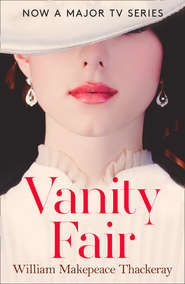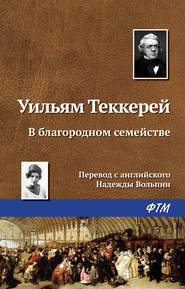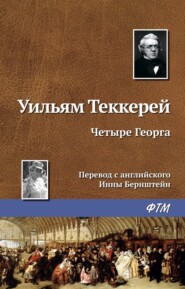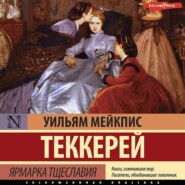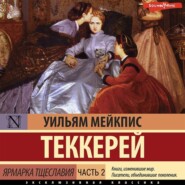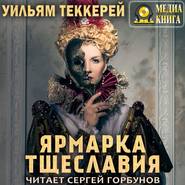По всем вопросам обращайтесь на: info@litportal.ru
(©) 2003-2024.
✖
A History of Pendennis. Volume 1. His fortunes and misfortunes, his friends and his greatest enemy
Настройки чтения
Размер шрифта
Высота строк
Поля
So Pen said it was a little eccentric society of men of letters and men about town, to which he had been presented; and the major began to think that the young fellow had seen a good deal of the world since his arrival in London.
CHAPTER XXX.
THE KNIGHTS OF THE TEMPLE
Colleges, schools, and inns of court, still have some respect for antiquity, and maintain a great number of the customs and institutions of our ancestors, with which those persons who do not particularly regard their forefathers, or perhaps are not very well acquainted with them, have long since done away. A well-ordained work-house or prison is much better provided with the appliances of health, comfort, and cleanliness, than a respectable Foundation School, a venerable College, or a learned Inn. In the latter place of residence men are contented to sleep in dingy closets, and to pay for the sitting-room and the cupboard, which is their dormitory, the price of a good villa and garden in the suburbs, or of a roomy house in the neglected squares of the town. The poorest mechanic in Spitalfields has a cistern and an unbounded supply of water at his command; but the gentlemen of the inns of court, and the gentlemen of the universities, have their supply of this cosmetic fetched in jugs by laundresses and bedmakers, and live in abodes which were erected long before the custom of cleanliness and decency obtained among us. There are individuals still alive who sneer at the people and speak of them with epithets of scorn. Gentlemen, there can be but little doubt that your ancestors were the Great Unwashed: and in the Temple especially, it is pretty certain, that, only under the greatest difficulties and restrictions, the virtue which has been pronounced to be next to godliness could have been practiced at all.
Old Grump, of the Norfolk Circuit, who had lived for more than thirty years in the chambers under those occupied by Warrington and Pendennis, and who used to be awakened by the roaring of the shower-baths which those gentlemen had erected in their apartments – a part of the contents of which occasionally trickled through the roof into Mr. Grump's room – declared that the practice was an absurd, newfangled, dandyfied folly, and daily cursed the laundress who slopped the staircase by which he had to pass. Grump, now much more than half a century old, had indeed never used the luxury in question. He had done without water very well, and so had our fathers before him. Of all those knights and baronets, lords and gentlemen, bearing arms, whose escutcheons are painted upon the walls of the famous hall of the Upper Temple, was there no philanthropist good-natured enough to devise a set of Hummums for the benefit of the lawyers, his fellows and successors? The Temple historian makes no mention of such a scheme. There is Pump Court and Fountain Court, with their hydraulic apparatus, but one never heard of a bencher disporting in the fountain; and can't but think how many a counsel learned in the law of old days might have benefited by the pump.
Nevertheless, those venerable Inns which have the Lamb and Flag and the Winged Horse for their ensigns, have attractions for persons who inhabit them, and a share of rough comforts and freedom, which men always remember with pleasure. I don't know whether the student of law permits himself the refreshment of enthusiasm, or indulges in poetical reminiscences as he passes by historical chambers, and says, "Yonder Eldon lived – upon this site Coke mused upon Lyttleton – here Chitty toiled – here Barnwell and Alderson joined in their famous labors – here Byles composed his great work upon bills, and Smith compiled his immortal leading cases – here Gustavus still toils, with Solomon to aid him;" but the man of letters can't but love the place which has been inhabited by so many of his brethren, or peopled by their creations as real to us at this day as the authors whose children they were – and Sir Roger de Coverley walking in the Temple Garden, and discoursing with Mr. Spectator about the beauties in hoops and patches who are sauntering over the grass, is just as lively a figure to me as old Samuel Johnson rolling through the fog with the Scotch gentleman at his heels on their way to Dr. Goldsmith's chambers in Brick Court; or Harry Fielding, with inked ruffles and a wet towel round his head, dashing off articles at midnight for the Covent Garden Journal, while the printer's boy is asleep in the passage.
If we could but get the history of a single day as it passed in any one of those four-storied houses in the dingy court where our friends Pen and Warrington dwelt, some Temple Asmodeus might furnish us with a queer volume. There may be a great parliamentary counsel on the ground-floor, who drives off to Belgravia at dinner time, when his clerk, too, becomes a gentleman, and goes away to entertain his friends, and to take his pleasure. But a short time since he was hungry and briefless in some garret of the Inn; lived by stealthy literature; hoped, and waited, and sickened, and no clients came; exhausted his own means and his friends' kindness; had to remonstrate humbly with duns, and to implore the patience of poor creditors. Ruin seemed to be staring him in the face, when, behold, a turn of the wheel of fortune, and the lucky wretch in possession of one of those prodigious prizes which are sometimes drawn in the great lottery of the Bar. Many a better lawyer than himself does not make a fifth part of the income of his clerk, who, a few months since, could scarcely get credit for blacking for his master's unpaid boots. On the first-floor, perhaps, you will have a venerable man whose name is famous, who has lived for half a century in the Inn, whose brains are full of books, and whose shelves are stored with classical and legal lore. He has lived alone all these fifty years, alone and for himself, amassing learning, and compiling a fortune. He comes home now at night alone from the club, where he has been dining freely, to the lonely chambers where he lives a godless old recluse. When he dies, his Inn will erect a tablet to his honor, and his heirs burn a part of his library. Would you like to have such a prospect for your old age, to store up learning and money, and end so? But we must not linger too long by Mr. Doomsday's door. Worthy Mr. Grump lives over him, who is also an ancient inhabitant of the Inn, and who, when Doomsday comes home to read Catullus, is sitting down with three steady seniors of his standing, to a steady rubber at whist, after a dinner at which they have consumed their three steady bottles of Port. You may see the old boys asleep at the Temple Church of a Sunday. Attorneys seldom trouble them, and they have small fortunes of their own. On the other side of the third landing, where Pen and Warrington live, till long after midnight, sits Mr. Paley, who took the highest honors, and who is a fellow of his college, who will sit and read and note cases until two o'clock in the morning; who will rise at seven and be at the pleader's chambers as soon as they are open, where he will work until an hour before dinner-time; who will come home from Hall and read and note cases again until dawn next day, when perhaps Mr. Arthur Pendennis and his friend Mr. Warrington are returning from some of their wild expeditions. How differently employed Mr. Paley has been! He has not been throwing himself away: he has only been bringing a great intellect laboriously down to the comprehension of a mean subject, and in his fierce grasp of that, resolutely excluding from his mind all higher thoughts, all better things, all the wisdom of philosophers and historians, all the thoughts of poets; all wit, fancy, reflection, art, love, truth altogether – so that he may master that enormous legend of the law, which he proposes to gain his livelihood by expounding. Warrington and Paley had been competitors for university honors in former days, and had run each other hard; and every body said now that the former was wasting his time and energies, while all people praised Paley for his industry. There may be doubts, however, as to which was using his time best. The one could afford time to think, and the other never could. The one could have sympathies and do kindnesses; and the other must needs be always selfish. He could not cultivate a friendship or do a charity, or admire a work of genius, or kindle at the sight of beauty or the sound of a sweet song – he had no time, and no eyes for any thing but his law-books. All was dark outside his reading-lamp. Love, and Nature, and Art (which is the expression of our praise and sense of the beautiful world of God), were shut out from him. And as he turned off his lonely lamp at night, he never thought but that he had spent the day profitably, and went to sleep alike thankless and remorseless. But he shuddered when he met his old companion Warrington on the stairs, and shunned him as one that was doomed to perdition.
It may have been the sight of that cadaverous ambition, and self-complacent meanness, which showed itself in Paley's yellow face, and twinkled in his narrow eyes, or it may have been a natural appetite for pleasure and joviality, of which it must be confessed Mr. Pen was exceedingly fond, which deterred that luckless youth from pursuing his designs upon the Bench or the Woolsack with the ardor, or rather steadiness, which is requisite in gentlemen who would climb to those seats of honor. He enjoyed the Temple life with a great deal of relish: his worthy relatives thought he was reading as became a regular student; and his uncle wrote home congratulatory letters to the kind widow at Fairoaks, announcing that the lad had sown his wild oats, and was becoming quite steady. The truth is, that it was a new sort of excitement to Pen, the life in which he was now engaged; and having given up some of the dandyfied pretensions, and fine-gentleman airs which he had contracted among his aristocratic college acquaintances, of whom he now saw but little, the rough pleasures and amusements of a London bachelor were very novel and agreeable to him, and he enjoyed them all. Time was he would have envied the dandies their fine horses in Rotten Row, but he was contented now to walk in the Park and look at them. He was too young to succeed in London society without a better name and a larger fortune than he had, and too lazy to get on without these adjuncts. Old Pendennis fondly thought he was busied with law because he neglected the social advantages presented to him, and, having been at half a dozen balls and evening parties, retreated before their dullness and sameness; and whenever any body made inquiries of the worthy major about his nephew, the old gentleman said the young rascal was reformed, and could not be got away from his books. But the major would have been almost as much horrified as Mr. Paley was, had he known what was Mr. Pen's real course of life, and how much pleasure entered into his law studies.
A long morning's reading, a walk in the Park, a pull on the river, a stretch up the hill to Hampstead, and a modest tavern dinner; a bachelor night passed here or there, in joviality, not vice (for Arthur Pendennis admired women so heartily that he never could bear the society of any of them that were not, in his fancy at least, good and pure); a quiet evening at home, alone with a friend and a pipe or two, and a humble potation of British spirits, whereof Mrs. Flanagan, the laundress, invariably tested the quality; these were our young gentleman's pursuits, and it must be owned that his life was not unpleasant. In term-time, Mr. Pen showed a most praiseworthy regularity in performing one part of the law-student's course of duty, and eating his dinners in Hall. Indeed, that Hall of the Upper Temple is a sight not uninteresting, and with the exception of some trifling improvements and anachronisms which have been introduced into the practice there, a man may sit down and fancy that he joins in a meal of the seventeenth century. The bar have their messes, the students their tables apart; the benchers sit at the high table on the raised platform, surrounded by pictures of judges of the law and portraits of royal personages who have honored its festivities with their presence and patronage. Pen looked about, on his first introduction, not a little amused with the scene which he witnessed. Among his comrades of the student class there were gentlemen of all ages, from sixty to seventeen; stout gray-headed attorneys who were proceeding to take the superior dignity – dandies and men-about-town who wished, for some reason, to be barristers of seven years' standing – swarthy, black-eyed natives of the Colonies, who came to be called here before they practiced in their own islands – and many gentlemen of the Irish nation, who make a sojourn in Middle Temple Lane before they return to the green country of their birth. There were little squads of reading students who talked law all dinner-time; there were rowing men, whose discourse was of sculling matches, the Red House, Vauxhall, and the Opera; there were others great in politics, and orators of the students' debating clubs; with all of which sets, except the first, whose talk was an almost unknown and a quite uninteresting language to him, Mr. Pen made a gradual acquaintance, and had many points of sympathy.
The ancient and liberal Inn of the Upper Temple provides in its Hall, and for a most moderate price, an excellent wholesome dinner of soup, meat, tarts, and port wine or sherry, for the barristers and students who attend that place of refection. The parties are arranged in messes of four, each of which quarters has its piece of beef or leg of mutton, its sufficient apple-pie and its bottle of wine. But the honest habitués of the hall, among the lower rank of students, who have a taste for good living, have many harmless arts by which they improve their banquet, and innocent "dodges" (if we may be permitted to use an excellent phrase that has become vernacular since the appearance of the last dictionaries) by which they strive to attain for themselves more delicate food than the common every-day roast meat of the students' tables.
"Wait a bit," said Mr. Lowton, one of these Temple gourmands. "Wait a bit," said Mr. Lowton, tugging at Pen's gown – "the tables are very full, and there's only three benchers to eat ten side dishes – if we wait, perhaps we shall get something from their table." And Pen looked with some amusement, as did Mr. Lowton with eyes of fond desire, toward the benchers' high table, where three old gentlemen were standing up before a dozen silver dish-covers, while the clerk was quavering out a grace.
Lowton was great in the conduct of the dinner. His aim was to manage so as to be the first, a captain of the mess, and to secure for himself the thirteenth glass of the bottle of port wine. Thus he would have the command of the joint on which he operated his favorite cuts, and made rapid, dexterous appropriations of gravy, which amused Pen infinitely. Poor Jack Lowton! thy pleasures in life were very harmless; an eager epicure, thy desires did not go beyond eighteen-pence.
Pen was somewhat older than many of his fellow-students, and there was that about his style and appearance which, as we have said, was rather haughty and impertinent, that stamped him as a man of ton– very unlike those pale students who were talking law to one another, and those ferocious dandies, in rowing shirts and astonishing pins and waistcoats, who represented the idle part of the little community. The humble and good-natured Lowton had felt attracted by Pen's superior looks and presence – and had made acquaintance with him at the mess by opening the conversation.
"This is boiled-beef day, I believe, sir," said Lowton to Pen.
"Upon my word, sir, I'm not aware," said Pen, hardly able to contain his laughter, but added, "I'm a stranger; this is my first term;" on which Lowton began to point out to him the notabilities in the Hall.
"That's Boosey the bencher, the bald one sitting under the picture and aving soup; I wonder whether it's turtle? They often ave turtle. Next is Balls, the king's counsel, and Swettenham – Hodge and Swettenham, you know. That's old Grump, the senior of the bar; they say he's dined here forty years. They often send 'em down their fish from the benchers to the senior table. Do you see those four fellows seated opposite us? Those are regular swells – tip-top fellows, I can tell you – Mr. Trail, the Bishop of Ealing's son, Honorable Fred. Ringwood, Lord Cinqbar's brother, you know. He'll have a good place, I bet any money; and Bob Suckling, who's always with them – a high fellow, too. Ha! ha!" Here Lowton burst into a laugh.
"What is it?" said Pen, still amused.
"I say, I like to mess with those chaps," Lowton said, winking his eye knowingly, and pouring out his glass of wine.
"And why?" asked Pen.
"Why! they don't come down here to dine, you know, they only make believe to dine. They dine here, Law bless you! They go to some of the swell clubs, or else to some grand dinner party. You see their names in the 'Morning Post' at all the fine parties in London. Why, I bet any thing that Ringwood has his cab, or Trail his Brougham (he's a devil of a fellow, and makes the bishop's money spin, I can tell you) at the corner of Essex-street at this minute. They dine! They won't dine these two hours, I dare say."
"But why should you like to mess with them, if they don't eat any dinner?" Pen asked, still puzzled. "There's plenty, isn't there?"
"How green you are," said Lowton. "Excuse me, but you are green. They don't drink any wine, don't you see, and a fellow gets the bottle to himself, if he likes it, when he messes with those three chaps. That's why Corkoran got in with 'em."
"Ah, Mr. Lowton, I see you are a sly fellow," Pen said, delighted with his acquaintance: on which the other modestly replied, that he had lived in London the better part of his life, and of course had his eyes about him; and went on with his catalogue to Pen.
"There's a lot of Irish here," he said; "that Corkoran's one, and I can't say I like him. You see that handsome chap with the blue neck-cloth and pink shirt, and yellow waistcoat, that's another; that's Molloy Maloney of Ballymaloney, and nephew to Major-general Sir Hector O'Dowd, he, he," Lowton said, trying to imitate the Hibernian accent. "He's always bragging about his uncle; and came into Hall in silver-striped trowsers the day he had been presented. That other near him, with the long black hair, is a tremendous rebel. By Jove, sir, to hear him at the Forum it makes your blood freeze; and the next is an Irishman, too, Jack Finucane, reporter of a newspaper. They all stick together, those Irish. It's your turn to fill your glass. What! you won't have any port? Don't like port with your dinner? Here's your health." And this worthy man found himself not the less attached to Pendennis because the latter disliked port wine at dinner.
It was while Pen was taking his share of one of these dinners, with his acquaintance Lowton as the captain of his mess, that there came to join them a gentleman in a barrister's gown, who could not find a seat, as it appeared, among the persons of his own degree, and who strode over the table, and took his seat on the bench where Pen sate. He was dressed in old clothes and a faded gown, which hung behind him, and he wore a shirt, which, though clean, was extremely ragged, and very different to the magnificent pink raiment of Mr. Molloy Maloney, who occupied a commanding position in the next mess. In order to notify their appearance at dinner, it is the custom of the gentlemen who eat in the Upper Temple Hall to write down their names upon slips of paper, which are provided for that purpose, with a pencil for each mess. Lowton wrote his name first, then came Arthur Pendennis, and the next was that of the gentleman in the old clothes. He smiled when he saw Pen's name, and looked at him. "We ought to know each other," he said. "We're both Boniface men; my name's Warrington."
"Are you St – Warrington?" Pen said, delighted to see this hero.
Warrington laughed – "Stunning Warrington – yes," he said. "I recollect you in your freshman's term. But you appear to have quite cut me out."
"The college talks about you still," said Pen, who had a generous admiration for talent and pluck. "The bargeman you thrashed, Bill Simes, don't you remember, wants you up again at Oxbridge. The Miss Notleys, the haberdashers – "
"Hush!" said Warrington – "glad to make your acquaintance, Pendennis. Heard a good deal about you."
The young men were friends immediately, and at once deep in college-talk. And Pen, who had been acting rather the fine gentleman on a previous day, when he pretended to Lowton that he could not drink port wine at dinner, seeing Warrington take his share with a great deal of gusto, did not scruple about helping himself any more, rather to the disappointment of honest Lowton. When the dinner was over, Warrington asked Arthur where he was going.
"I thought of going home to dress, and hear Grisi in Norma," Pen said.
"Are you going to meet any body there?" he asked.
Pen said, "No – only to hear the music, of which he was very fond."
"You had much better come home and smoke a pipe with me," said Warrington – "a very short one. Come, I live close by in Lamb Court, and we'll talk over Boniface and old times."
They went away; Lowton sighed after them. He knew that Warrington was a baronet's son, and he looked up with simple reverence to all the aristocracy. Pen and Warrington became sworn friends from that night. Warrington's cheerfulness and jovial temper, his good sense, his rough welcome, and his never-failing pipe of tobacco, charmed Pen, who found it more pleasant to dive into shilling taverns with him, than to dine in solitary state among the silent and polite frequenters of the Polyanthus.
Ere long Pen gave up the lodgings in St. James's, to which he had migrated on quitting his hotel, and found it was much more economical to take up his abode with Warrington in Lamb Court, and furnish and occupy his friend's vacant room there. For it must be said of Pen, that no man was more easily led than he to do a thing, when it was a novelty, or when he had a mind to it. And Pidgeon, the youth, and Flanagan, the laundress, divided their allegiance now between Warrington and Pen.
CHAPTER XXXI.
OLD AND NEW ACQUAINTANCES
Elated with the idea of seeing life, Pen went into a hundred queer London haunts. He liked to think he was consorting with all sorts of men – so he beheld coalheavers in their tap-rooms; boxers in their inn-parlors; honest citizens disporting in the suburbs or on the river; and he would have liked to hob and nob with celebrated pick-pockets, or drink a pot of ale with a company of burglars and cracksmen, had chance afforded him an opportunity of making the acquaintance of this class of society. It was good to see the gravity with which Warrington listened to the Tutbury Pet or the Brighton Stunner at the Champion's Arms, and behold the interest which he took in the coalheaving company assembled at the Fox-under-the-Hill. His acquaintance with the public-houses of the metropolis and its neighborhood, and with the frequenters of their various parlors, was prodigious. He was the personal friend of the landlord and landlady, and welcome to the bar as to the club-room. He liked their society, he said, better than that of his own class, whose manners annoyed him, and whose conversation bored him. "In society," he used to say, "ever body is the same, wears the same dress, eats and drinks, and says the same things; one young dandy at the club talks and looks just like another, one Miss at a ball exactly resembles another, whereas there's character here. I like to talk with the strongest man in England, or the man who can drink the most beer in England, or with that tremendous republican of a hatter, who thinks Thistlewood was the greatest character in history. I like gin-and-water better than claret. I like a sanded floor in Carnaby Market better than a chalked one in Mayfair. I prefer Snobs, I own it." Indeed, this gentleman was a social republican; and it never entered his head while conversing with Jack and Tom that he was in any respect their better; although, perhaps, the deference which they paid him might secretly please him.
Pen followed him then to these various resorts of men with great glee and assiduity. But he was considerably younger, and therefore much more pompous and stately than Warrington; in fact, a young prince in disguise, visiting the poor of his father's kingdom. They respected him as a high chap, a fine fellow, a regular young swell. He had somehow about him an air of imperious good-humor, and a royal frankness and majesty, although he was only heir apparent to twopence-halfpenny, and but one in descent from a gallypot. If these positions are made for us, we acquiesce in them very easily; and are always pretty ready to assume a superiority over those who are as good as ourselves. Pen's condescension at this time of his life was a fine thing to witness. Among men of ability this assumption and impertinence passes off with extreme youth: but it is curious to watch the conceit of a generous and clever lad – there is something almost touching in that early exhibition of simplicity and folly.
So, after reading pretty hard of a morning, and, I fear, not law merely, but politics and general history and literature, which were as necessary for the advancement and instruction of a young man as mere dry law, after applying with tolerable assiduity to letters, to reviews, to elemental books of law, and, above all, to the newspaper, until the hour of dinner was drawing nigh, these young gentlemen would sally out upon the town with great spirits and appetite, and bent upon enjoying a merry night as they had passed a pleasant forenoon. It was a jovial time, that of four-and-twenty, when every muscle of mind and body was in healthy action, when the world was new as yet, and one moved over it spurred onward by good spirits and the delightful capability to enjoy. If ever we feel young afterward, it is with the comrades of that time: the tunes we hum in our old age, are those we learned then. Sometimes, perhaps, the festivity of that period revives in our memory; but how dingy the pleasure-garden has grown, how tattered the garlands look, how scant and old the company, and what a number of the lights have gone out since that day! Gray hairs have come on like daylight streaming in – daylight and a headache with it. Pleasure has gone to bed with the rouge on her cheeks. Well, friend, let us walk through the day, sober and sad, but friendly.
I wonder what Laura and Helen would have said, could they have seen, as they might not unfrequently have done, had they been up and in London, in the very early morning, when the bridges began to blush in the sunrise, and the tranquil streets of the city to shine in the dawn, Mr. Pen and Mr. Warrington rattling over the echoing flags toward the Temple, after one of their wild nights of carouse – nights wild, but not so wicked as such nights sometimes are, for Warrington was a woman-hater; and Pen, as we have said, too lofty to stoop to a vulgar intrigue. Our young Prince of Fairoaks never could speak to one of the sex but with respectful courtesy, and shrank from a coarse word or gesture with instinctive delicacy – for though we have seen him fall in love with a fool, as his betters and inferiors have done, and as it is probable that he did more than once in his life, yet for the time of the delusion it was always as a goddess that he considered her, and chose to wait upon her. Men serve women kneeling – when they get on their feet, they go away.
That was what on acquaintance of Pen's said to him in his hard, homely way; an old friend with whom he had fallen in again in London – no other than honest Mr. Bows of the Chatteries Theater, who was now employed as piano-forte player, to accompany the eminent lyrical talent which nightly delighted the public at the Fielding's Head in Covent Garden: and where was held the little club called the Back Kitchen.
Numbers of Pen's friends frequented this very merry meeting. The Fielding's Head had been a house of entertainment, almost since the time when the famous author of Tom Jones presided as magistrate in the neighboring Bow-street; his place was pointed out, and the chair said to have been his, still occupied by the president of the night's entertainment. The worthy Cutts, the landlord of the Fielding's Head, generally occupied this post when not disabled by gout or other illness. His jolly appearance and fine voice may be remembered by some of my male readers: he used to sing profusely in the course of the harmonic meeting, and his songs were of what may be called the British Brandy-and-Water School of Song – such as "The Good Old English Gentleman," "Dear Tom, this Brown Jug," and so forth – songs in which pathos and hospitality are blended, and the praises of good liquor and the social affections are chanted in a barytone voice. The charms of our women, the heroic deeds of our naval and military commanders, are often sung in the ballads of this school, and many a time in my youth have I admired how Cutts the singer, after he had worked us all up to patriotic enthusiasm, by describing the way in which the brave Abercrombie received his death-wound, or made us join him in tears, which he shed liberally himself, as in faltering accents he told how autumn's falling leaf "proclaimed the old man he must die" – how Cutts the singer became at once Cutts the landlord, and, before the applause which we were making with our fists on his table, in compliment to his heart-stirring melody, had died away, was calling, "Now, gentlemen, give your orders, the waiter's in the room – John, a champagne cup for Mr. Green. I think, sir, you said sausages and mashed potatoes? John, attend on the gentleman."
"And I'll thank ye give me a glass of punch too, John, and take care the wather boils," a voice would cry not unfrequently, a well-known voice to Pen, which made the lad blush and start when he heard it first – that of the venerable Captain Costigan; who was now established in London, and one of the great pillars of the harmonic meetings at the Fielding's Head.
The captain's manners and conversation brought very many young men to the place. He was a character, and his fame had begun to spread soon after his arrival in the metropolis, and especially after his daughter's marriage. He was great in his conversation to the friend for the time being (who was the neighbor drinking by his side), about "me daughter." He told of her marriage, and of the events previous and subsequent to that ceremony; of the carriages she kept; of Mirabel's adoration for her and for him; of the hundther pounds which he was at perfect liberty to draw from his son-in-law, whenever necessity urged him. And having stated that it was his firm intention to "dthraw next Sathurday, I give ye me secred word and honor next Sathurday, the fourteenth, when ye'll see the money will be handed over to me at Coutts's, the very instant I present the check," the captain would not unfrequently propose to borrow a half-crown of his friend until the arrival of that day of Greek Calends, when, on the honor of an officer and gentleman, he would repee the thrifling obligetion.
Sir Charles Mirabel had not that enthusiastic attachment to his father-in-law, of which the latter sometimes boasted (although in other stages of emotion Cos would inveigh, with tears in his eyes, against the ingratitude of the child of his bosom, and the stinginess of the wealthy old man who had married her); but the pair had acted not unkindly toward Costigan; had settled a small pension on him, which was paid regularly, and forestalled with even more regularity by poor Cos; and the period of the payments were always well known by his friend at the Fielding's Head, whither the honest captain took care to repair, bank notes in hand, calling loudly for change in the midst of the full harmonic meeting. "I think ye'll find that note won't be refused at the Bank of England, Cutts, my boy," Captain Costigan would say. "Bows, have a glass? Ye needn't stint yourself to-night, any how; and a glass of punch will make ye play con spirito." For he was lavishly free with his money when it came to him, and was scarcely known to button his breeches pocket, except when the coin was gone, or sometimes, indeed, when a creditor came by.
It was in one of these moments of exultation that Pen found his old friend swaggering at the singers' table at the back kitchen of the Fielding's Head, and ordering glasses of brandy and water for any of his acquaintances who made their appearance in the apartment. Warrington who was on confidential terms with the bass singer, made his way up to this quarter of the room, and Pen walked at his friend's heels.
Pen started and blushed to see Costigan. He had just come from Lady Whiston's party, where he had met and spoken with the captain's daughter again, for the first time after very old, old days. He came up with out-stretched hand, very kindly and warmly to greet the old man; still retaining a strong remembrance, of the time when Costigan's daughter had been every thing in the world to him. For though this young gentleman may have been somewhat capricious in his attachments, and occasionally have transferred his affections from one woman to another, yet he always respected the place where Love had dwelt, and, like the Sultan of Turkey, desired that honors should be paid to the lady toward whom he had once thrown the royal pocket-handkerchief.
The tipsy captain returning the clasp of Pen's hand with all the strength of a palm which had become very shaky by the constant lifting up of weights of brandy-and-water, looked hard in Pen's face, and said, "Grecious heavens, is it possible? Me dear boy, me dear fellow, me dear friend;" and then with a look of muddled curiosity, fairly broke down with, "I know your face, me dear, dear friend, but, bedad, I've forgot your name." Five years of constant punch had passed since Pen and Costigan met. Arthur was a good deal changed, and the captain may surely be excused for forgetting him; when a man at the actual moment sees things double, we may expect that his view of the past will be rather muzzy.






